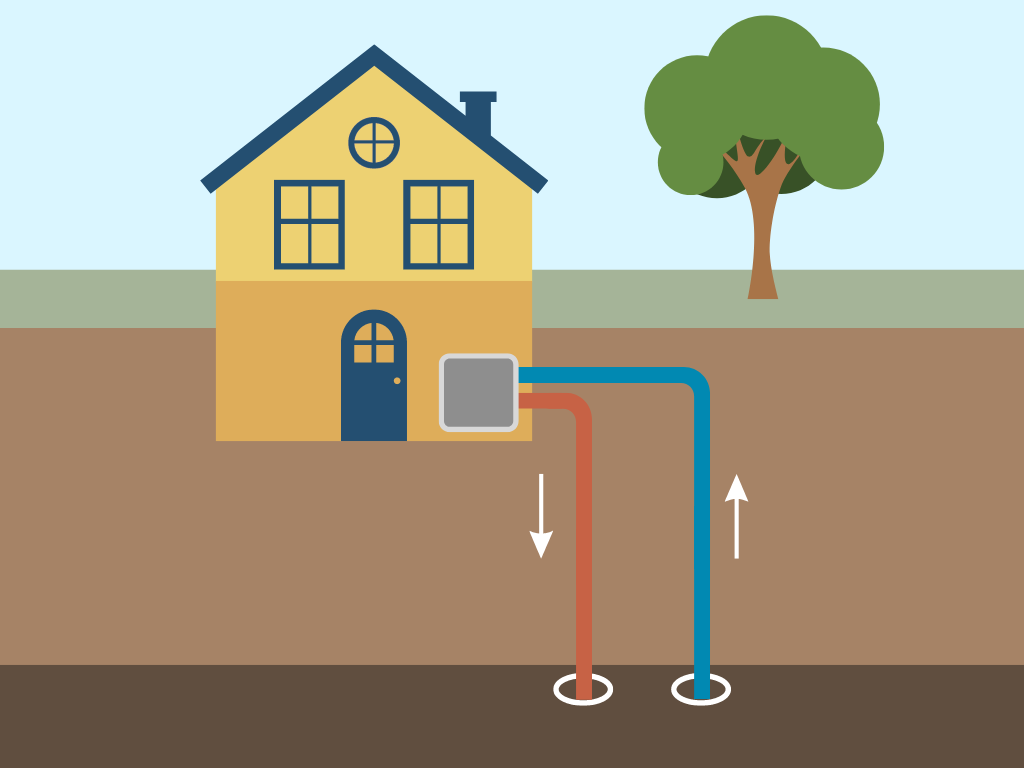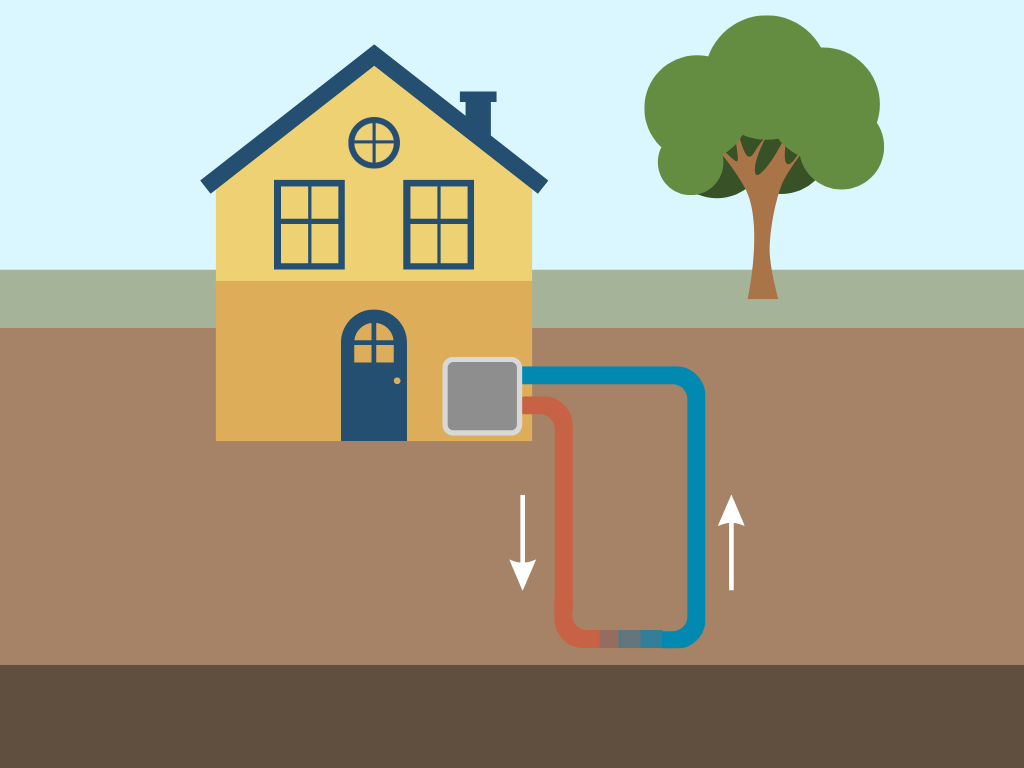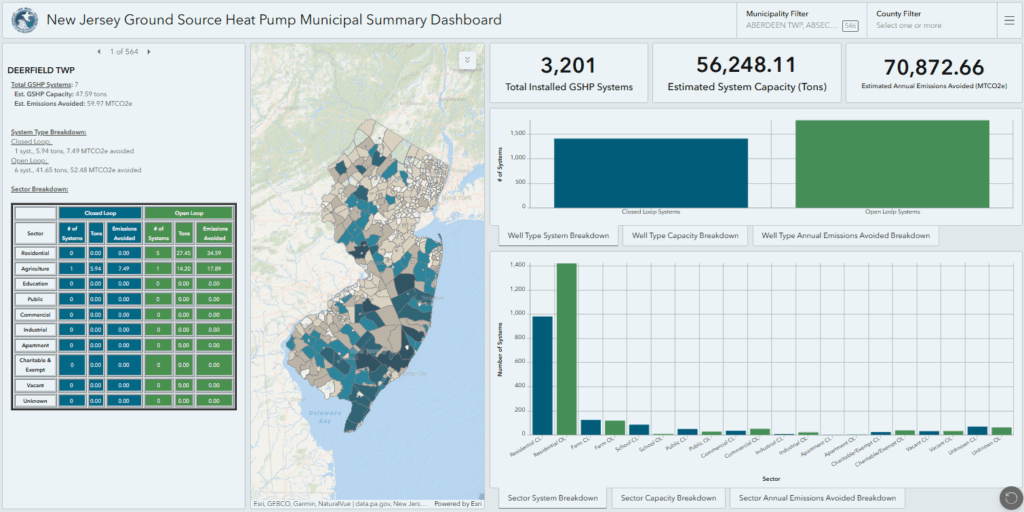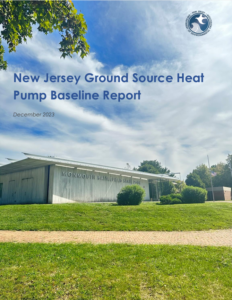
GROUND SOURCE HEAT PUMPS
Ground Source Heat Pumps
Ground Source Heat Pump (GSHP) systems, also referred to as Geothermal Heat Pumps (GHP), are an energy efficient technology used in space heating and cooling which present opportunities for cost savings and emissions reductions across the building sector.
TECHNOLOGY OVERVIEW
Ground Source Heat Pump systems were first developed in the late 1940’s. Differing from direct source geothermal energy production, oriented around steam-based electricity generation, GSHP systems leverage the relative constant temperature at depth to transfer heat between the earth and a building. GSHP systems are composed of three main components integrated into a building’s Heating Ventilation and Air Conditioning (HVAC) system. This includes the ground heat exchanger, the heat pump unit, and the building distribution system. The system can be configured in a variety of ways. The most distinctive variation lies with the ground heat exchanger, which can be either open-loop or closed-loop. Open-loop GSHP configurations utilize a groundwater well or a surface water body as the heat exchange media to transfer thermal energy directly throughout to system. Although open-loop GSHP systems are historically less expensive to install, they are more sensitive to local geology, lithology, and environmental quality conditions which may negatively impact long-term operating costs. Closed-loop GSHP systems, as the name suggests, circulates a thermally conductive water-based solution throughout the continuous ground heat exchanger and is shut-off from the environment. These systems have been more common in New Jersey in recent years and can be configured in either a vertical or horizontal orientation.

Open Loop

Closed Loop
APPLICATIONS & BENEFITS
GSHP systems are very versatile in their application and can operate in both heating and cooling modes. When designed effectively, they are highly efficient, capable of operating at scale across a wide range of thermal demand and can serve both residential and commercial & industrial applications. GSHP systems are one of the most efficient residential heating and cooling systems available and operate with efficiencies up to 70% and 40% higher than other heating and cooling systems respectively, and can also be designed to heat domestic hot water. Additionally, these systems are highly reliable with long expected operating lifetimes. Some ground heat exchanger manufacturers offer up to a 50-year warranty, with the above-ground components are relatively simple to maintain or replace.
From a consumer perspective, GSHP adopters stand to recover upfront costs and realize significant thermal energy savings over the medium to long term. The cost recovery timeline can be shortened dramatically when energy efficiency incentive programs are utilized. In residential applications the cost effectiveness may be further amplified in communities that are constrained by thermal fuel source options, showing potential to replace low efficiency fossil heating fuels such as liquid propane or heating oil. When scaled up to commercial and industrial and campus or district applications, economies of scale and capital cost funding mechanisms show potential for higher overall efficacy in cost recovery and emissions reductions. Furthermore, as GSHP systems operate using electricity, they indirectly take advantage of the renewable and high efficiency nonrenewable generation within the regional grid. Air quality regulation and targeted renewable energy growth over the last twenty years, as seen in New Jersey, has drastically driven down local and regional criteria pollutants and greenhouse gases (GHG). When coupled with on-site renewables and other energy efficiency and building decarbonization measures, GSHP system benefits can be compounded to further optimize climate mitigation efforts. This consideration poses significant opportunities for widespread GHG reduction in the building sector which will be critical in meeting climate goals.
GROUND SOURCE HEAT PUMPS IN NEW JERSEY
Energy efficiency and building decarbonization are core tenants of the state’s broader approach to achieving its greenhouse gas reduction goals, as highlighted in its 2019 Energy Master Plan and the Global Warming Response Act 80×50 Recommendations report. New Jersey is home to more than 3,000 GSHP systems, with early adopters dating back to over fifty years ago. Currently, residential applications dominate the market share, but the versatility of GSHP technology is apparent in the instances of systems across property classifications. The data below is representative through December 31, 2024.
Number of Open Loop GHP Systems
1,789
Number of Closed Loop GHP Systems
1,412
Total Number of GHP Systems
3,201
The New Jersey Department of Environmental Protection’s Bureau of Climate Change & Clean Energy has recently published the “New Jersey Ground Source Heat Pump Baseline Report”. This report was developed with the objective of establishing foundational information to inform future policies supporting use of ground source heat pumps (GSHP) in New Jersey. The report leverages historic NJDEP GSHP well records, Geographic Information Systems (GIS), stakeholder surveys, informational interviews, and emissions reduction estimates to investigate deployment, climate mitigation benefits, and the barriers to adoption of GSHP technology. In doing so, this report illustrates trends in GSHP installations over time, identifies locations of systems and the building sectors they serve, quantifies emissions reduction benefits, and integrates input from GSHP developers to put forward strategic policy recommendations.
NJ GROUND SOURCE HEAT PUMP MUNICIPAL SUMMARY DASHBOARD
To further highlight ground source heat pump deployment across the State, the Bureau created an interactive dashboard that provides information about ground source heat pump systems installed in New Jersey, aggregated at the municipal level. The dashboard provides users with an overview of the number of systems installed in the State, as well as estimates regarding the capacity of each system, as well as estimates of the annual emissions being avoided by these clean heating/cooling technologies when compared to conventional heating/cooling technologies. The dashboard provides additional information related to the type of GSHP system (closed loop vs open loop), as well as the sector/building type the systems are serving, based on the Parcel/MOD IV property classification. Users can utilize the filters in the dashboard to select one or more counties/municipalities to learn about the current levels of GSHP adoption.

INDUSTRY & WORKFORCE
Unlike emerging domestic clean energy technology such as offshore wind, GSHP systems have an established supply chain in the United States and abroad, with a workforce embedded within the engineering, HVAC, plumbing, and well drilling industries. Industry groups play an important role in supporting the current GSHP industry, particularly for workforce and market development. These groups consist of professional organizations that drive licensing and training programs, standards and best practices, design and planning resources, trade advocacy groups, marketing resources, and supply chain management.
| Logo | Name | Description | Link |
|---|---|---|---|
 |
IGSHPA | International Ground Source Heat Pump Association | Information clearinghouse, education and research, trade group, professional certification, design tools and consulting | IGSHPA | International Ground Source Heat Pump Association |
 |
National Ground Water Association (NGWA) | Standards writing and best practices conformance, trade group, professional certification for vertical closed-loop systems. | Groundwater | NGWA Home |
 |
American Society of Heating, Refrigerating and Air-conditioning Engineers, Inc. (ASHRAE) | Standards writing and guidelines compliance, publishing, research, and continuing education. | Home | ASHRAE |
 |
Geothermal Exchange Organization | Trade advocacy group, fosters partnerships and public outreach. | Home – Geothermal Exchange Organization |
| Air Conditioning, Heating & Refrigeration Institute (AHRI) | Trade Association representing manufacturers of HVACR and water heating equipment. Globally recognized equipment certification program. | Air-Conditioning, Heating, and Refrigeration Institute | AHRI |
